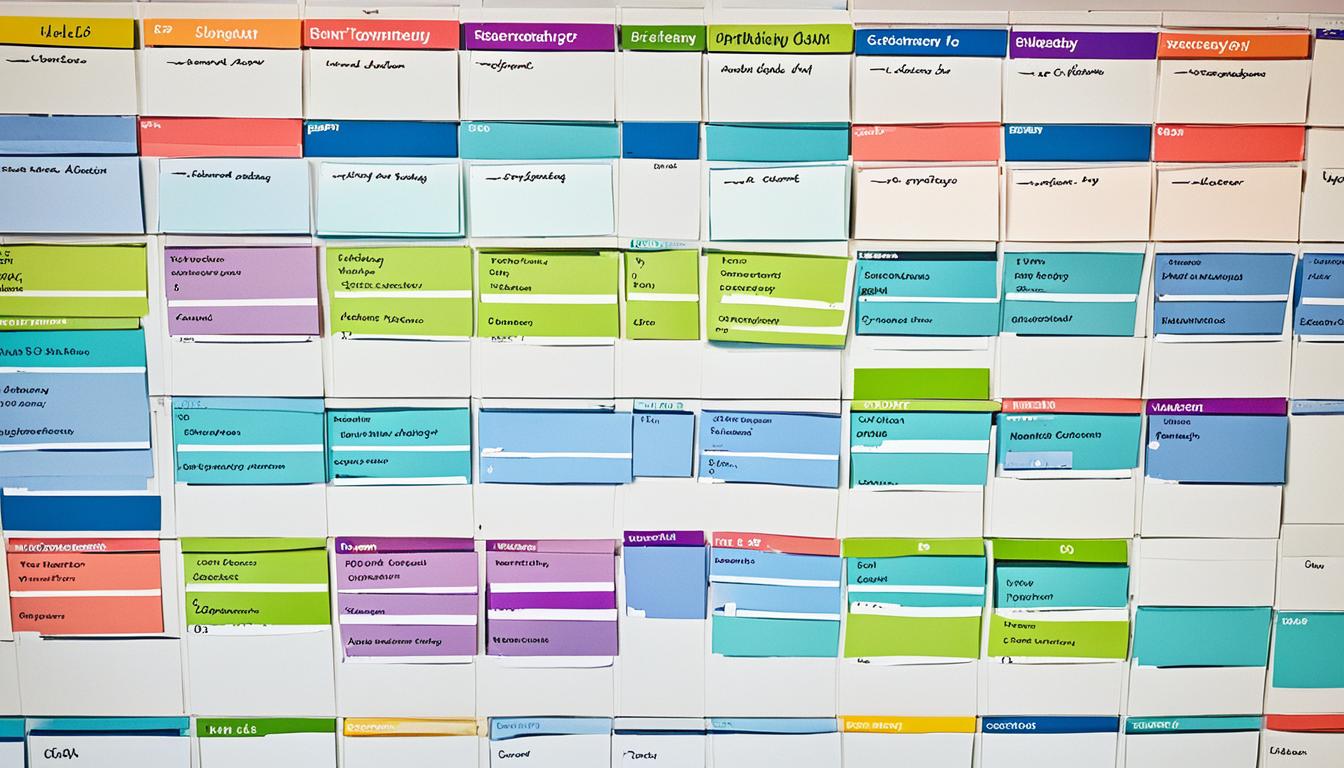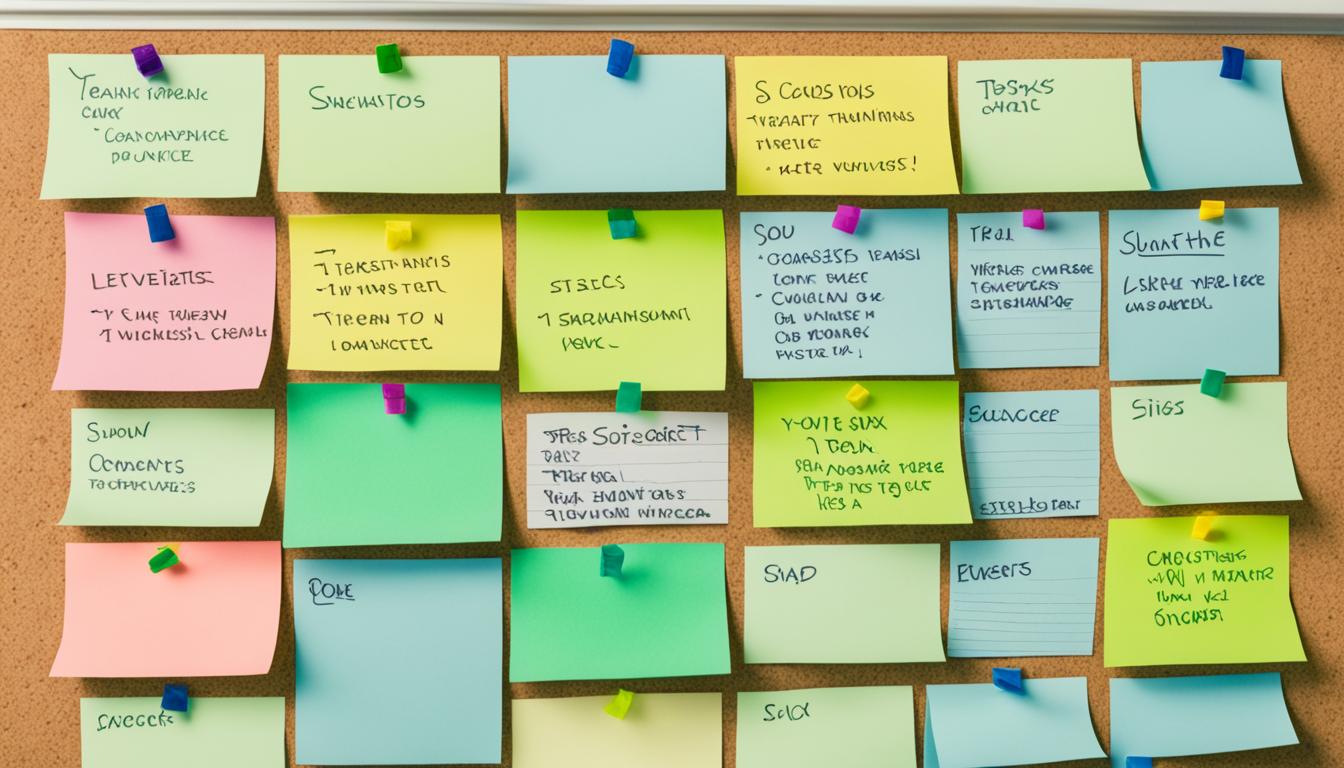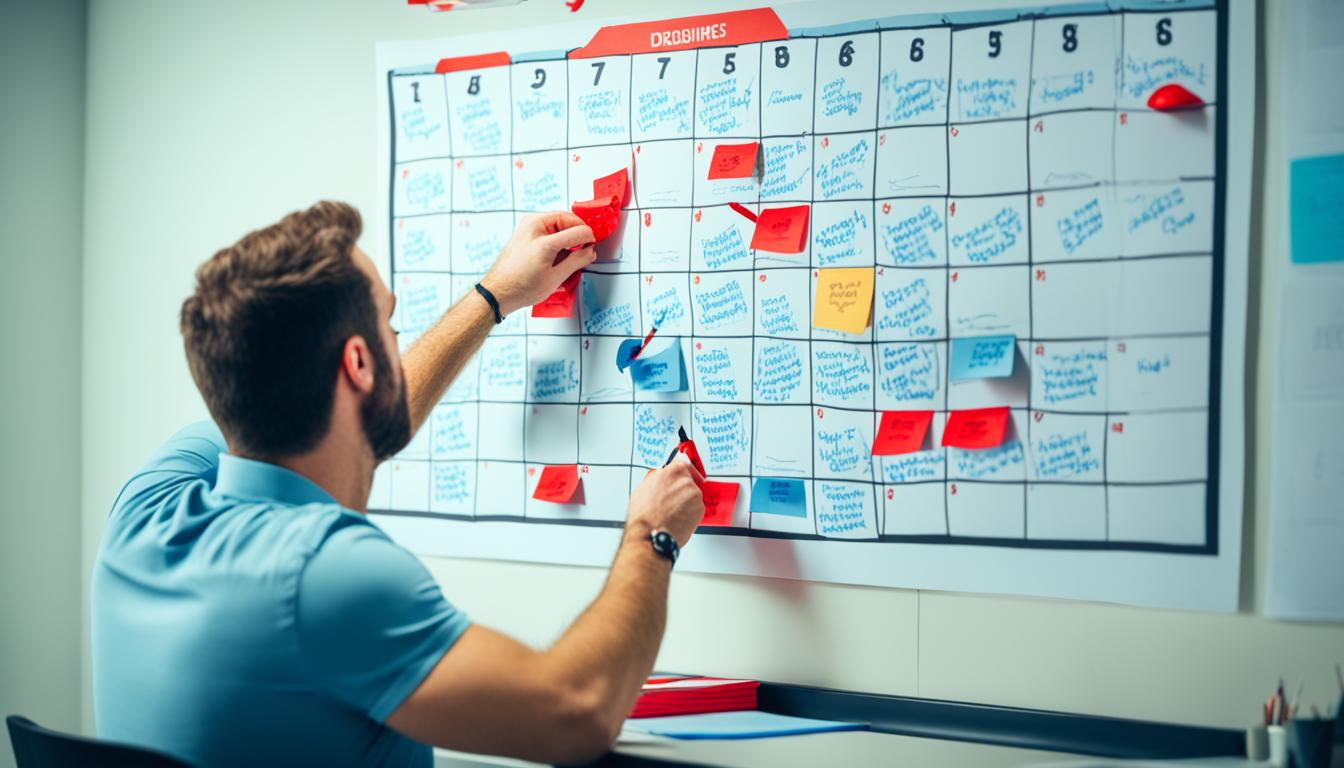Being productive helps students succeed in school and life. Managing time and resources well boosts grades and happiness. Using good strategies like time management helps students juggle school and fun.
Managing time well means students finish schoolwork and enjoy hobbies. Taking breaks helps increase focus. A good study space boosts concentration too.
It’s important to avoid distractions like social media. Turning off notifications can help focus. Good sleep, food, and exercise keep productivity high.
Joining sports clubs benefits your body, social life, and mind. It’s okay to seek help if you’re feeling mentally overwhelmed.
Studying when you’re most awake really helps. So does starting on assignments early. Breaking big tasks into smaller ones reduces late work.
Productivity apps can make organizing easier. Many students feel more in control when they use these tools. Apps like Anki and Google Calendar are quite helpful.
Following these tips can help students do well in school and have time for fun. Balancing work and life leads to a rewarding student life.
Use a Calendar
Students find using a calendar very helpful for managing their time. It shows academic and personal schedules. This helps plan each day and avoid taking on too much.
It also helps create a daily routine that mixes study and fun. This balance is key for success in school.
Benefits of Using a Calendar
A calendar gives a clear view of your time. It ensures you don’t forget important tasks and deadlines. Students can see what needs to be done first, which helps keep their minds clear.
It also makes sure there’s time for fun with friends. This is important for staying happy and healthy. Plus, students can plan when to use helpful resources like those from Columbia Southern University.
Top Free Online Calendars for Students
There are several great free online calendars planner for students. Google Calendar is a favorite because it has many helpful features. It can schedule meetings and send reminders.
Apple Calendar works well for those who use Apple products. Outlook and Cozi are good for keeping track of school and personal life. Canvas has a planner for schoolwork too.
Make a To-Do List
Making a to-do list is key to managing your work well. It helps students organize their day and get things done on time. These lists also break big tasks into smaller, easier steps. This makes you feel less overwhelmed.
Prioritizing Tasks
Prioritizing tasks is very important. It helps you manage your work without getting too stressed. Heath & Heath (2010) found that making progress on a big project is more motivating than starting a small one. Making sub-lists for big tasks, like writing papers, helps you stay focused and feel less stressed. Using planners to organize your tasks and deadlines shows you how you’re doing, which keeps you motivated.
Understanding the Zeigarnik Effect
The Zeigarnik effect shows we remember uncompleted tasks better than those we’ve finished. Taking breaks between tasks helps use this effect to stay focused and remember better. Knowing about this effect helps in planning your study breaks, making you more productive. Your planner should be flexible. If you often don’t finish tasks, it’s time to relook at your priorities. Working in short bursts, like 10-30 minutes, helps you make progress without getting overwhelmed.
Set and Stick to Deadlines
Setting deadlines helps students finish projects and reach their goals. It makes big tasks smaller and manageable. This helps students plan better and avoid waiting until the last minute.
Meeting deadlines is key to successful planning. It keeps students focused and moving forward. Writing down goals helps make them real, which improves focus and hard work.
Setting the right time for tasks is important. It makes work go smoothly and quickly. Knowing which tasks are most important helps meet deadlines better. Starting early also builds confidence and keeps things going.
Planning ahead for mistakes helps keep students on track. Getting help from others can make meeting deadlines easier. Making deadline setting fun can also keep students interested and active.
Being good at setting and meeting deadlines is crucial for doing well in school and later in work. It leads to better habits, less wasted effort, and improved results. It also adds urgency to get things done.
Find Your Most Productive Hours
Finding your best hours for work can change how well you do as a student. By finding when you do best, you can plan your tasks when you’re more awake and focused. This way, not only will your study time be better, but you’ll also manage your energy all day.
Identifying Peak Productivity Times
To find when you work best, watch how you feel during the day. Use a journal or an app to track when you’re most alert. If you like being with others, you might work best then. If you prefer quiet, those might be your best times. Knowing this helps you pick the right time for hard tasks.
Successful students know managing time well leads to success. They do tough assignments when they’re most alert. By knowing when you work best, you can improve your grades too.
Leveraging High Productivity Hours
After finding your best hours, use them well. Do the hardest tasks during these times. Like a top student who also goes to the gym and has a job, use your best times well. This helps handle more without losing energy.
Students who plan their day around when they work best do better than others. By studying when you’re most alert, you’ll do well in school. This way, you’ll be more balanced and do better overall.
Know Your Limit
Knowing your limits is essential for handling your work well and setting boundaries. Taking on too much can lead to burnout. This can hurt your school performance and your mental health. Studies show that taking short breaks, like a 17-minute pause every 57 minutes, can boost your productivity. Students need to set boundaries to keep from getting burnt out. This helps avoid mistakes and dropping the quality of your work.
Most college students admit they delay their work, says the American Psychological Association. This shows the need for better planning. Techniques like the Eisenhower matrix help sort tasks, making it easier to see what’s important. Also, knowing when you work best can help you do more in less time.
Avoiding distractions is key to being productive. Making a space without distractions means you can focus better. You’ll work better and get more done.
American adults spend a lot of time with media every day, including social media for 2.5 hours. Cutting down on this can give you more time for important things. Using too much time on unimportant things causes stress and makes you less efficient. It shows why setting strict boundaries for yourself is so important.
Knowing your natural body clock helps in managing your tasks without getting burned out. Studies say college students should find out if they’re morning or night people. This helps use their best times for work. Finally, managing your energy well by working during these peak times can improve your school results. It also helps you stay well.
Get Enough Sleep

Getting enough sleep is key for students to do well in school. Young adults aged 18 to 25 need 7 to 9 hours every night. High schoolers need about 8 to 10 hours. Yet, many don’t get enough sleep.
The Importance of Sleep for Students
Sleep is crucial for doing well in school. Most college students sleep less than 8 hours on weeknights. More than half get less than 7 hours. Not sleeping enough is bad for the brain.
Not getting enough sleep leads to health issues. These include gaining weight, heart problems, and diabetes. It can also cause mental health problems like anxiety and depression.
Following sleep rules helps students do better. It helps with thinking, solving problems, and remembering things. In short, sleep is important for success in school and life.
Limit Distractions

In the modern academic setting, distractions are a big hurdle. Dr. Larry Rosen’s research shows that students get distracted for at least 5 minutes every 15 minutes of study. This breaks focus and makes tasks take longer to finish.
To study well, cutting down distractions is key. By using “Do Not Disturb” on phones, adjusting notifications, and putting on noise-canceling headphones, you can study without interruptions.
Effective Strategies to Avoid Distractions
A quiet study spot is a good strategy. Let those around you know when you need to focus. This way, they won’t interrupt you. Also, writing down tasks can help you remember and concentrate better.
Splitting your study time with short breaks can boost your productivity. For example, rest for 10 minutes after studying for 45-50 minutes.
Playing classical music can help you focus more. Keeping your study area clean can ease stress and motivate you. Ending a study session with a reward keeps you focused and productive.
Don’t Skip Class
Going to class regularly is more than about getting good grades. It helps you really get into the course and grasp the work. Being there often shows you’re serious about your studies. Professors and classmates will notice your dedication. This can lead to better grades and even job chances.
Benefits of Regular Class Attendance
Being in class a lot helps you understand the work better. You also keep up with what you need to do and stay organized. When you’re there, you can join in more, which means less cramming later. This way, hard topics become simpler, improving your understanding.
School costs a lot, making going to class even more important. Public college classes cost about $51.02 each, and private ones about $69.40. Missing class means wasting money and falling behind. It can also make you stressed about catching up and what teachers think of you. Plus, being there might boost your grades directly.
Good study habits and being active in class pay off. If you go to lecture, you’ll remember things better when you study. But bad study ways can drop your grades a lot. The right study times and going to class can make you do better. This support helps you learn more effectively.
It’s key not to miss class. Doing so sets you up for success in school and later in life. Making it a priority comes with great benefits for your future career and learning.
Switch Up Your Study Environment
Having a great study spot can really help students focus and get more done. Most college students study for about 17 hours each week. So, it’s very important to find ways to study better, especially if you’re busy with other things.
It helps to have a study place that fits what you like. You could set up a quiet spot at home or check out places where others are studying. You could also try new spots like coffee shops or parks. Aurora Colquette loves studying in a forest, and Naeem Jaraysi enjoys the change of going to coffee shops.
Having some background noise can help you stay on track. Using earbuds or headphones is a good idea to block out distractions. Keeping your study stuff organized also saves time and keeps you focused.
Good lighting is key to avoid tiring your eyes and to stay productive. Try to study near a window to use natural light. Sitting in an ergonomic chair can also help you concentrate better and stay comfy while studying.
Inspiring things around you, like family photos or encouraging notes, can lift your spirits. Jennifer Breshears keeps her diplomas up to remind her why she’s working hard. Amber Alaniz surrounds herself with things that make her feel good.
Dr. Tom Anastasi says that the right environment makes a big difference in how much you get done. Finding a spot that feels right, whether it’s quiet or cozy, is important. Amber Alaniz suggests changing where you study to keep things fresh.
Using scents like lavender or rosemary can help you focus and remember better. Keeping your desk tidy and studying when it’s quiet are important tips, especially if you have a lot to juggle.
To sum up, changing where you study can make learning easier, help you stay focused, and boost your study game.
How to Be More Productive as a Student
To do well, balance school and life. Start with good habits like exercising, eating right, and practicing mindfulness. These steps make a strong base for doing well every day.
Balancing Academic and Personal Life
To balance life, manage your time and know what’s important. Make a weekly list of tasks. Then, set time for both schoolwork and fun. This way, you prevent too much stress.
Turn off your phone when studying to focus better. Take short breaks to keep your brain fresh. Grouping tasks also helps you be more efficient. Then, you have more time to relax.
Developing Healthy Habits
Healthy habits are key to doing well and feeling good. Exercise and eating well help your brain work better. This makes studying easier.
Sleeping enough, about eight hours, keeps you energetic and focused. Mindfulness, like meditating, reduces stress and improves focus. Using school support helps both in classes and life. With these habits, you can do well in school and life.
Utilize the Pomodoro Technique
The Pomodoro Technique helps manage time with focus intervals, known as “pomodoros,” followed by breaks. You work hard for 25 minutes, then take a five-minute break. It was created by Francesco Cirillo in the late 1980s for better study sessions.
Students break big tasks into smaller steps with the Pomodoro Technique. It helps avoid interruptions, saving thoughts for later. It fights distractions and makes planning easier.
Using this method consistently is important. After four pomodoros, take a 20-minute break. This routine helps stay productive, prevents burnout, and increases accountability.
You can change how long a pomodoro lasts based on what works for you. Tracking them helps understand how long tasks take. It also helps stop putting things off and feeling swamped.
Now, there are many apps for this technique for iPhone, Android, and Apple OS. The Pomodoro Technique improves mindfulness and focus during study times. It’s a great way to get better at managing time and increasing productivity for students.
Conclusion
Being a productive student means managing your time well and setting clear, smart goals. You need to break down big tasks into small wins. This helps you stay motivated and focused. Using the SMART criteria makes your goals clear and achievable. It helps you study better and reach your goals.
It’s smart to use calendars and to-do lists to keep on track. Setting realistic deadlines helps too. By staggering deadlines, you avoid getting too stressed. This keeps your schedule balanced. Prioritizing your work helps you stay calm and in control. Adding in time for fun and breaks is key for productivity and health.
Being flexible and resilient is very important for students. Flexibility helps you keep your schedule in sync across your devices. Using tools that fit your learning style saves time and stress. Methods like Pomodoro, getting enough sleep, and avoiding distractions make you a better student. Choosing strategies that suit you leads to success in school and happiness.
FAQ
How can using a calendar improve student productivity?
A calendar helps students see their time. It keeps stress and clutter away. It mixes school and fun times, making life smooth.
What are some of the top free online calendars for students?
Great free calendars for students are Google Calendar, Outlook, Cozi, and Apple Calendar. They offer reminders and help stay on track.
How does making a to-do list help prioritize tasks?
To-do lists let students sort and handle tasks well. They cut down stress. This means focusing on big tasks first, which is smart.
What is the Zeigarnik Effect and how does it relate to productivity?
The Zeigarnik Effect says we remember unfinished tasks well. It suggests breaks help with task management. Keeping tasks in mind boosts productivity.
Why is it important to set and stick to deadlines?
Deadlines add structure and help make choices. They break big tasks into small ones. Meeting deadlines fights procrastination and keeps good reputations.
How can students identify their most productive hours?
By noticing when they feel alert and focused, students can find their best times. Working on tough tasks during these peaks boosts output.
What strategies can help students avoid burnout by knowing their limits?
Knowing limits, setting boundaries, and managing tasks well are key. This keeps productivity up without harm. It avoids too much work and stress.
How does sleep impact student productivity?
Good sleep is key for being productive. Bad sleep hurts work and grades. 7-9 hours a night is recommended for sharp thinking.
What are effective strategies to limit distractions while studying?
Useful tactics include “Do Not Disturb” on phones and quiet places. Telling friends when you’re busy helps too. This reduces breaks in focus.
Why shouldn’t students skip classes?
Going to class is vital for keeping up and understanding lessons. It shows commitment. This method leads to better learning and grades.
How does changing study environments enhance productivity?
Different study spots can spark new focus and ideas. Places like libraries or parks may help. Finding the right spot boosts concentration.
How can students balance academic demands with personal life?
Balancing studies and life needs healthy habits. Exercise, good food, and mindfulness matter. This balance helps growth without losing wellness.
What is the Pomodoro Technique and how does it benefit students?
The Pomodoro Technique is about work bursts and breaks. It uses 25-minute study sessions. This method boosts attention and makes work periods effective.

More Posts
Top 5 Innovative Digital Calendar Planners to boost productivity
In today’s fast-paced digital world, maintaining a productive life requires powerful tools to manage our time effectively. That’s where innovative digital calendar planners come in. Whether you’re juggling personal planning or managing a...
End-of-Month Reflection A Path to Self-Discovery
Starting a new year is often seen as a prime time for self-reflection. Lisanne van Marrewijk highlights the significant benefits it offers for heightened awareness and deepened self-knowledge. Reflection creates valuable learning opportunities,...
Top 50 Self Help Blogs You Should Know About
Finding blogs that facilitate your personal needs and encourages you to accomplish the challenges you might face in the future. We’ve gathered some of the top self-development/productivity blogs you should add to your...
Time Tracking Benefits for Freelancers & Small Business Owners
Time is a valuable resource, and tracking it efficiently is crucial to the success of freelancers and small business owners. One powerful tool that can help optimize time management is time tracking. By...




